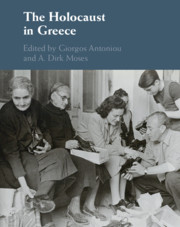Book contents
- The Holocaust in Greece
- The Holocaust in Greece
- Copyright page
- Contents
- Figures and Maps
- Tables
- Contributors
- Preface
- Introduction: The Holocaust in Greece
- I Perpetrators
- II Collaborators and Victims
- 4 Greek Collaboration in the Holocaust and the Course of the War
- 5 A City against Its Citizens? Thessaloniki and the Jews
- 6 Bystanders, Rescuers, and Collaborators: A Microhistory of Christian–Jewish Relations, 1943–1944
- 7 “We Lived as Greeks and We Died as Greeks”: Thessalonican Jews in Auschwitz and the Meanings of Nationhood
- III The Question of Property
- IV The Aftermath: Survival, Restitution, Memory
- Epilogue
- Index
6 - Bystanders, Rescuers, and Collaborators: A Microhistory of Christian–Jewish Relations, 1943–1944
from II - Collaborators and Victims
Published online by Cambridge University Press: 26 October 2018
- The Holocaust in Greece
- The Holocaust in Greece
- Copyright page
- Contents
- Figures and Maps
- Tables
- Contributors
- Preface
- Introduction: The Holocaust in Greece
- I Perpetrators
- II Collaborators and Victims
- 4 Greek Collaboration in the Holocaust and the Course of the War
- 5 A City against Its Citizens? Thessaloniki and the Jews
- 6 Bystanders, Rescuers, and Collaborators: A Microhistory of Christian–Jewish Relations, 1943–1944
- 7 “We Lived as Greeks and We Died as Greeks”: Thessalonican Jews in Auschwitz and the Meanings of Nationhood
- III The Question of Property
- IV The Aftermath: Survival, Restitution, Memory
- Epilogue
- Index
Summary
- Type
- Chapter
- Information
- The Holocaust in Greece , pp. 135 - 156Publisher: Cambridge University PressPrint publication year: 2018
- 1
- Cited by



